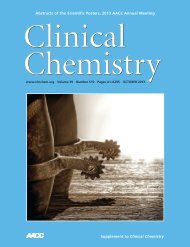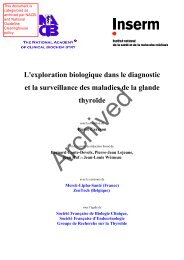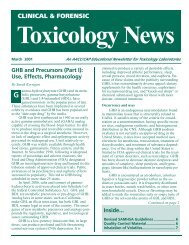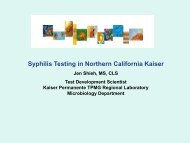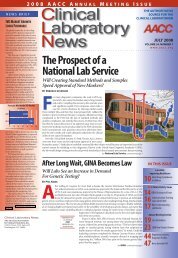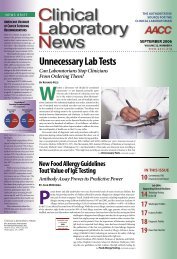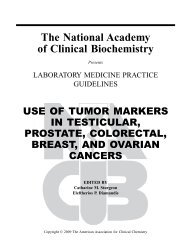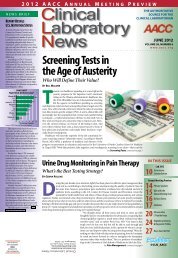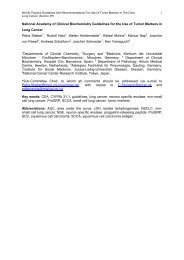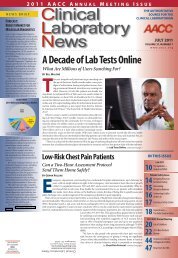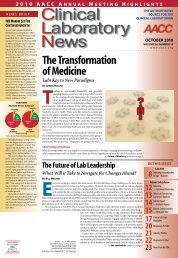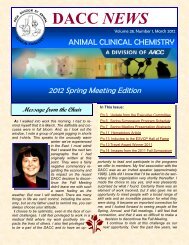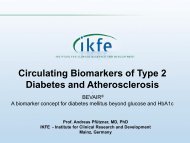Download the Monday Daily - American Association for Clinical ...
Download the Monday Daily - American Association for Clinical ...
Download the Monday Daily - American Association for Clinical ...
Create successful ePaper yourself
Turn your PDF publications into a flip-book with our unique Google optimized e-Paper software.
AACC Awards, from page 10<br />
Award <strong>for</strong> Outstanding Contributions<br />
Through Service to <strong>the</strong> Profession<br />
Sponsored by Beckman Coulter, Inc.<br />
Susan A. Evans, PhD, FACB<br />
Dr. Evans is vice president<br />
and general manager of<br />
Agencourt Bioscience, a<br />
Beckman Coulter Company<br />
in Beverly, Mass., that<br />
provides genomic services<br />
and nucleic acid purification products <strong>for</strong><br />
clinical and life science researchers. She<br />
has more than 25 years of experience in<br />
<strong>the</strong> diagnostic industry, holding leadership<br />
positions in research and development and<br />
now general management. She has developed<br />
assays <strong>for</strong> analytes in <strong>the</strong> areas of endocrinology,<br />
fertility, cardiac markers, and<br />
TDM. Dr. Evans’s involvement with AACC<br />
began in <strong>the</strong> 1980s, when she served as an<br />
officer in <strong>the</strong> Florida Section and continued<br />
with local section activities in San Diego<br />
and Chicago. Her service to AACC on<br />
<strong>the</strong> national level includes being elected to<br />
<strong>the</strong> board of directors, as national secretary,<br />
and as president in 2003. She chaired <strong>the</strong><br />
Program Coordinating Commission twice,<br />
was one of <strong>the</strong> founding members of <strong>the</strong><br />
Industry Division, and is vice chair of <strong>the</strong><br />
2008 Annual Meeting Organizing Committee.<br />
She currently serves as president<br />
of <strong>the</strong> National Academy of <strong>Clinical</strong> Biochemistry,<br />
where she has also served on <strong>the</strong><br />
board of directors. Dr. Evans has also volunteered<br />
her time to <strong>the</strong> IFCC, including<br />
as secretary and corporate representative to<br />
its Education and Management Division,<br />
and to <strong>the</strong> <strong>Clinical</strong> Laboratory Standards<br />
Institute through membership on several<br />
committees.<br />
Award <strong>for</strong> Outstanding Scientific<br />
Achievements by a Young Investigator<br />
Sponsored by Roche Diagnostics<br />
Alex J. Rai, PhD, DABCC, FACB<br />
Dr. Rai is an assistant attending<br />
clinical chemist<br />
in <strong>the</strong> clinical chemistry<br />
service of <strong>the</strong> department<br />
of pathology at Memorial<br />
Sloan-Kettering Can-<br />
12 CliniCal laboratory news Special edition<br />
cer Center in New York City. During his<br />
fellowship training at <strong>the</strong> Johns Hopkins<br />
University School of Medicine, Dr. Rai<br />
focused on proteomics- and bioin<strong>for</strong>matics-based<br />
biomarker discovery in ovarian<br />
cancer, in addition to his clinical service<br />
training. His current research interests lie<br />
in <strong>the</strong> discovery of novel biomarkers <strong>for</strong><br />
cancer and <strong>the</strong>ir translation into clinically<br />
useful diagnostic tests. Recent projects<br />
have included biomarker discovery using<br />
multiplexed gene expression profiling and<br />
proteomics techniques, and development<br />
of assays <strong>for</strong> multiplexed single nucleotide<br />
polymorphism analysis. He is interested in<br />
designing, evaluating, and validating tests<br />
<strong>for</strong> stratifying cancer subtypes and identifying<br />
patients unable to metabolize chemo<strong>the</strong>rapeutic<br />
drugs. By stratifying a patient’s<br />
disease based on biomarker profiles and<br />
screening patient genotypes prior to <strong>the</strong>ir<br />
starting <strong>the</strong>rapy, treatment of a patient’s<br />
cancer and selection of <strong>the</strong> most appropriate<br />
<strong>the</strong>rapeutic regimen can be tailored.<br />
Dr. Rai has published more than 20 scientific<br />
articles and presented more than 25<br />
invited lectures nationally and internationally.<br />
He serves on committees <strong>for</strong> several<br />
professional organizations, including <strong>the</strong><br />
New York Metro Section of AACC, <strong>the</strong> National<br />
Academy of <strong>Clinical</strong> Biochemistry,<br />
and <strong>the</strong> <strong>Clinical</strong> Ligand Assay Society.<br />
International Travel Fellowship<br />
Sponsored by BD Diagnostics—<br />
Preanalytical Systems<br />
Renze Bais, PhD<br />
Dr. Bais is chief operating<br />
officer of Pacific Laboratory<br />
Medicine Services and<br />
clinical senior lecturer in<br />
<strong>the</strong> department of medicine<br />
at <strong>the</strong> University of<br />
Sydney. He is also an associate of <strong>the</strong> Royal<br />
College of Pathologists of Australasia. He<br />
has been involved in research and development<br />
in a variety of areas and published<br />
more than 90 scientific papers and book<br />
chapters and over 100 abstracts of presentations<br />
at both national and international<br />
meetings. He recently co-authored<br />
two chapters on enzymology <strong>for</strong> <strong>the</strong> Tietz<br />
Textbook of <strong>Clinical</strong> Chemistry and <strong>for</strong> Fundamentals<br />
of <strong>Clinical</strong> Chemistry. He has<br />
been active with <strong>the</strong> IFCC <strong>for</strong> many years,<br />
Genzyme Student Oral<br />
Presentations and Poster Contest<br />
<strong>Monday</strong>, July 28<br />
2:00 p.m.–4:30 p.m.<br />
Renaissance Washington, D.C. Hotel<br />
Congressional Hall B and C<br />
This symposium, which highlights research by students, offers presentations<br />
of student abstracts in both oral and poster <strong>for</strong>mats. The first hour<br />
consists of oral presentations from <strong>the</strong> four students who received <strong>the</strong><br />
highest scores in <strong>the</strong> preliminary judging phase of <strong>the</strong> contest, and <strong>the</strong><br />
remainder of <strong>the</strong> afternoon consists of students competing in <strong>the</strong> poster<br />
contest. Students will compete <strong>for</strong> cash awards as <strong>the</strong>y are judged on<br />
scientific content, originality, and presentation style. These events provide<br />
an inspiring glimpse of <strong>the</strong> future leaders in laboratory medicine.<br />
This program is funded by a generous gift provided by<br />
Genzyme Corporation to <strong>the</strong> Van Slyke Foundation.<br />
including 6 years as a member of Scientific<br />
Division Executive committee and 5 years<br />
as a member of <strong>the</strong> executive board and<br />
federation secretary. Dr. Bais has held various<br />
positions within <strong>the</strong> Australasian <strong>Association</strong><br />
of <strong>Clinical</strong> Biochemists, including<br />
chair of both <strong>the</strong> South Australian and<br />
New South Wales Branches, vice president,<br />
and chair of <strong>the</strong> Scientific and Regulatory<br />
Affairs Committee. For <strong>the</strong> past 5 years,<br />
Dr. Bais has been <strong>the</strong> Australian coordinator<br />
of <strong>the</strong> Australasian <strong>Association</strong> of<br />
<strong>Clinical</strong> Biochemists/Vietnamese <strong>Association</strong><br />
of <strong>Clinical</strong> Biochemistry joint project<br />
on quality assurance. This project aims to<br />
develop quality systems <strong>for</strong> Vietnamese<br />
laboratories and to set up quality assurance<br />
programs in Vietnam. He plans to use<br />
this International Travel Fellowship award<br />
to fur<strong>the</strong>r <strong>the</strong> development of quality systems<br />
and assurance programs in Sou<strong>the</strong>ast<br />
Asian countries.<br />
The Edwin F. Ullman Award<br />
Sponsored by Siemens Healthcare Diagnostics<br />
John F. Burd, PhD<br />
Dr. Burd is a co-founder<br />
and general partner of<br />
Sabur Technology in San<br />
Diego, Calif., a company<br />
dedicated to developing<br />
unique medical testing<br />
products. Previously, he was founder and<br />
CEO of Oculir, Inc., which developed a remarkable<br />
new non-invasive analyte testing<br />
technology. Dr. Burd has been a leader in a<br />
large number of companies involved in developing<br />
medical devices. He was a general<br />
partner of Windamere Venture Partners,<br />
a firm that started more than 15 medical<br />
product and biotechnology companies<br />
during his tenure. He was CEO of Mira-<br />
Medica, a company developing computeraided<br />
detection technology <strong>for</strong> enhanced<br />
cancer diagnosis that was sold to Kodak in<br />
August 2003. As president and CEO of Dex-<br />
Com, he directed <strong>the</strong> company’s work to<br />
develop, manufacture, and market <strong>the</strong> first<br />
long-term implantable glucose sensor. He<br />
was <strong>the</strong> founder of LXN Corp., which developed<br />
<strong>the</strong> Duet Diabetes Control System<br />
and <strong>the</strong> In Charge Diabetes Control System.<br />
LXN was sold to Johnson and Johnson in<br />
2000. At Quidel Corp., he directed <strong>the</strong> development<br />
of enzyme immunoassay products<br />
<strong>for</strong> <strong>the</strong> clinical laboratory, physician’s<br />
office, and home markets. As executive vice<br />
president of Mast Immunosystems, his responsibilities<br />
included research and development,<br />
marketing, sales, and finance. Dr.<br />
Burd began his career developing fluorescent<br />
immunoassays and per<strong>for</strong>ming medical<br />
product research and development at<br />
Miles Laboratories. Dr. Burd has authored<br />
and co-authored numerous articles and his<br />
work has led to 25 patents and <strong>the</strong> development<br />
of many innovative products.<br />
The AACC Past President’s Award<br />
Gary L. Myers, PhD, FACB<br />
Dr. Myers is chief of <strong>the</strong><br />
clinical chemistry branch<br />
at <strong>the</strong> Centers <strong>for</strong> Disease<br />
Control and Prevention<br />
(CDC) in Atlanta, Ga. He<br />
also serves as <strong>the</strong> scientific<br />
director of <strong>the</strong> World Health Organization<br />
Collaborating Center <strong>for</strong> Reference and<br />
Research in Blood Lipids at <strong>the</strong> CDC. His<br />
30-year career at <strong>the</strong> CDC has focused on<br />
improving <strong>the</strong> laboratory measurement of<br />
biochemical markers used to assess chronic<br />
disease risk, particularly cardiovascular<br />
disease. Dr. Myers has served AACC at all<br />
levels, including chair of <strong>the</strong> Lipids and Lipoproteins<br />
Division, 2002 Annual Meeting<br />
Organizing Committee, and 2006 Beckman<br />
Conference. He has served on <strong>the</strong><br />
Meetings Management Group, Nominating<br />
Committee, and Board of Directors.<br />
Under his leadership, 2007 was an exciting<br />
and busy year <strong>for</strong> AACC as it made progress<br />
in all of its strategic initiatives. It was<br />
also a transitional year, as Dr. Myers directed<br />
<strong>the</strong> search <strong>for</strong> a new editor-in-chief <strong>for</strong><br />
AACC’s flagship journal, <strong>Clinical</strong> Chemistry.<br />
It was a special year <strong>for</strong> <strong>the</strong> Web site Lab<br />
Tests Online, which expanded into six new<br />
countries, including Australia, Germany,<br />
Hungary, Italy, Poland, and Spain. Lab Tests<br />
Online is recognized as <strong>the</strong> premier online<br />
source <strong>for</strong> in<strong>for</strong>mation about laboratory<br />
testing. The Personalized Medicine Advisory<br />
Group was <strong>for</strong>med to recommend how<br />
AACC should embrace and become active<br />
in this rapidly expanding area. Ano<strong>the</strong>r<br />
important initiative was partnering with<br />
<strong>the</strong> <strong>Association</strong> <strong>for</strong> Molecular Pathology<br />
to develop and offer a molecular pathology<br />
review course in 2008.<br />
Award <strong>for</strong> Outstanding Contribution<br />
For a Publication in <strong>the</strong> International<br />
Journal <strong>Clinical</strong> Chemistry<br />
Sponsored by Siemens Healthcare Diagnostics<br />
Hassan Dihazi, PhD<br />
Dr. Dihazi is associate professor,<br />
group leader of proteomics<br />
in <strong>the</strong> department<br />
of nephrology and rheumatology,<br />
and director<br />
of <strong>the</strong> clinical proteomics<br />
facility at <strong>the</strong> Georg-August University in<br />
Göttingen, Germany. His research focuses<br />
on key proteins connecting cellular stress response<br />
pathways to renal diseases. His group<br />
also seeks to develop new clinical proteomics<br />
approaches <strong>for</strong> earlier diagnosis of human<br />
diseases and biomarker discovery. Dr.<br />
Dihazi is a council member of <strong>the</strong> Human<br />
Kidney and Urine Proteomics Project and<br />
<strong>the</strong> European Kidney and Urine Proteomics<br />
<strong>Association</strong>. He is also <strong>the</strong> co-founder of <strong>the</strong><br />
Göttingen Proteomics Forum. He is involved<br />
in several proteomics journals as an editorial<br />
board member and is editor-in-chief<br />
of Proteomics Insights. He has published a<br />
number of articles on proteomics, especially<br />
<strong>the</strong>ir relation to kidney function. In his winning<br />
article, “Characterization of diabetic<br />
nephropathy by urinary proteomic analysis:<br />
identification of a processed ubiquitin <strong>for</strong>m<br />
as differentially excreted protein in diabetic<br />
nephropathy patients,” Dr. Dihazi described<br />
a robust procedure <strong>for</strong> <strong>the</strong> identification and<br />
characterization of proteins differentially excreted<br />
in <strong>the</strong> urine of diabetic patients with<br />
microalbuminuria and/or macroalbuminuria.<br />
He also identified indicators of tissue<br />
injury in urine that may result in clinical<br />
applications <strong>for</strong> early diagnosis of diabetes<br />
mellitus-related nephropathy. The paper’s<br />
co-authors were Gerhard A. Mueller, Sandra<br />
Lindner, Markus Meyer, Abdul R. Asif,<br />
Michael Oellerich, and Frank Strutz (Clin<br />
Chem 2007; 53:9, 1636–1645).



